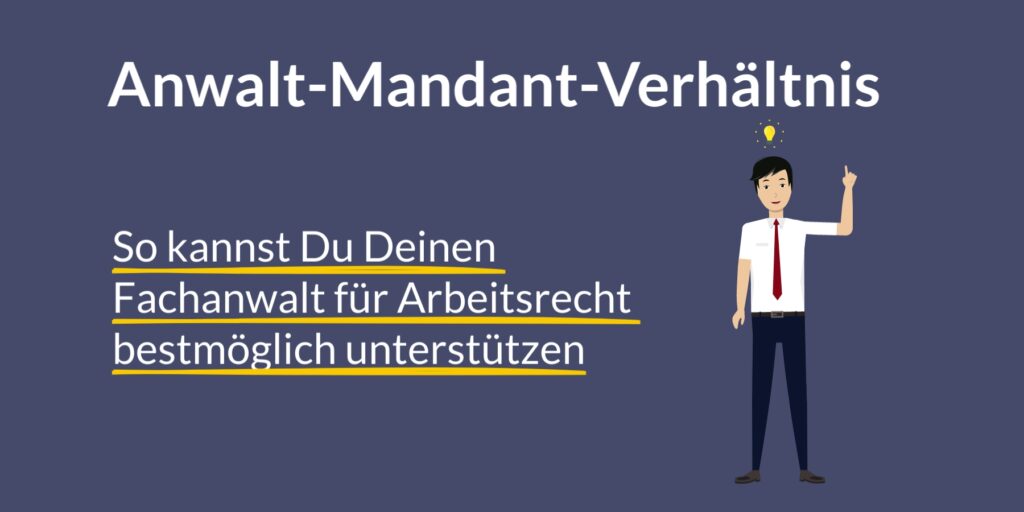
Anyone with an employment law concern often hires an employment lawyer, especially for more complex issues. Especially when it comes to termination and termination agreements, there's no way around engaging a qualified attorney.
And in many cases the Expectations with the clients: “Now the matter is with the lawyer, he/she will take care of it.” The question is whether clients can truly relax when they receive a mandate. However, the opposite is certainly true. Instead of letting the lawyer work on their employment law, they seek contact almost daily via email or phone.
These are two extremes in cooperation with lawyersBoth forms of maintaining contact with the lawyer are suboptimal. This leads to the question of what "optimal" means and how employees can support their employment lawyer.
In this article we will discuss this and show
- why clients should actively support their lawyer in their mandate,
- why too frequent contact is counterproductive and can impair the lawyer’s work,
- how employees can support their employment lawyer to achieve the best possible result for them.
Sit back and relax: “The employment lawyer will take care of it.”
It is not uncommon for clients to see Employment law attorney A kind of savior. This is supposed to guide the matter toward a successful conclusion, virtually at the push of a button and fully automatically. While you can completely sit back and devote yourself to other things. However, this notion is not only false, but also dangerous for clients.
No matter how good a lawyer for employment law may be, he is always also constructive and reliable cooperation The client is instructed. Of course, clients don't have to stand by and hold the lawyer's hand while they draft lawsuits or pleadings. A good employment lawyer knows what's important in a lawsuit or pleading.
However, it is essential that the client makes every effort to inform the employment lawyer about the actual circumstances to present the best possible picture. Only then can a lawyer organize the facts, put them into context, and derive the appropriate legal assumptions.
Incomplete or inaccurate information may lead to legally incorrect reviews And that ultimately comes at the expense of the clients and can cost them a lot of money.
Our personal experience is that we are able to offer the best possible service to those clients who get the best results can, the
- provide all relevant information and documents,
- respond quickly to inquiries,
- actively participate in the process,
- Answer the lawyer’s questions promptly,
- understand shared success as a team effort.
Such cases not only lead to the greatest possible success, but are also a lot of fun for both the client and the lawyer.
Too frequent contact is a problem
But there is a difference between constructive cooperation in the client relationship and overburdening the employment lawyer. too frequent contact Working with a specialist employment lawyer can be a major challenge. As you can probably imagine, many lawyers have a heavy workload. It's not as fast-paced as in a doctor's office—but there's never a shortage of work.
This is incompatible with all clients daily phone calls or answering emails. This would consume the lawyer's time and mental resources, which are urgently needed elsewhere. Many legal tasks require the undisturbed attention the lawyer and a absolute focus. Therefore, any distraction is a risk from a lawyer's perspective.
Lawsuits, pleadings and detailed research in particular require your lawyer to high level of concentration That's why your lawyer isn't always available. And it may take a while for them to respond to an email. This isn't a sign of disrespect; it directly reflects the quality of your legal work. In other words: It is a quality criterion and also benefits you and your case.
This doesn't mean you should stop contacting your lawyer. However, you should always consider whether contacting them is absolutely necessary. Assume that your employment law specialist Your case in full view and will come to you of his own accord at the appropriate time.
However, when it comes to the constructive cooperation in your case and you would like to share new information and developments, then you can and should contact your lawyer. It is best to inform him in advance by emailthat you have news and would like a meeting. Your lawyer would then have the opportunity to schedule your case and send you suggested appointment times.
How to best support your employment lawyer
So, we've already given you some information on how to best conduct yourself in a client relationship. In this section, we'd like to give you some golden rules on how you can best support your lawyer. Here are some 9 rules for a successful lawyer-client relationship:
- Provide your employment lawyer with all the necessary information
- You should respond to your lawyer’s requests promptly
- Think actively about the client relationship and get involved where it makes sense
- Make it clear to yourself that your lawyer has an eye on your case and all the circumstances (especially deadlines) (that's his job)
- Always remember that your lawyer’s time is valuable and the quality of legal work requires concentrated work phases
- Consider very carefully whether contacting your lawyer is actually necessary and sensible
- If you need to contact us, please send an email to the specialist employment lawyer in advance (requesting an appointment and the reason for the meeting).
- Be punctual and well prepared for appointments with your lawyer
- Always keep in mind that your employment law specialist only wants the best for you (financially and legally)
And what else is worth noting
The advice relates to communication and support from your lawyer. Of course, there are also numerous other points that are important in your relationship with a specialist employment lawyer. This includes, not least, the correct behavior in courtWe'll explain how best to behave there in one of the next posts.
